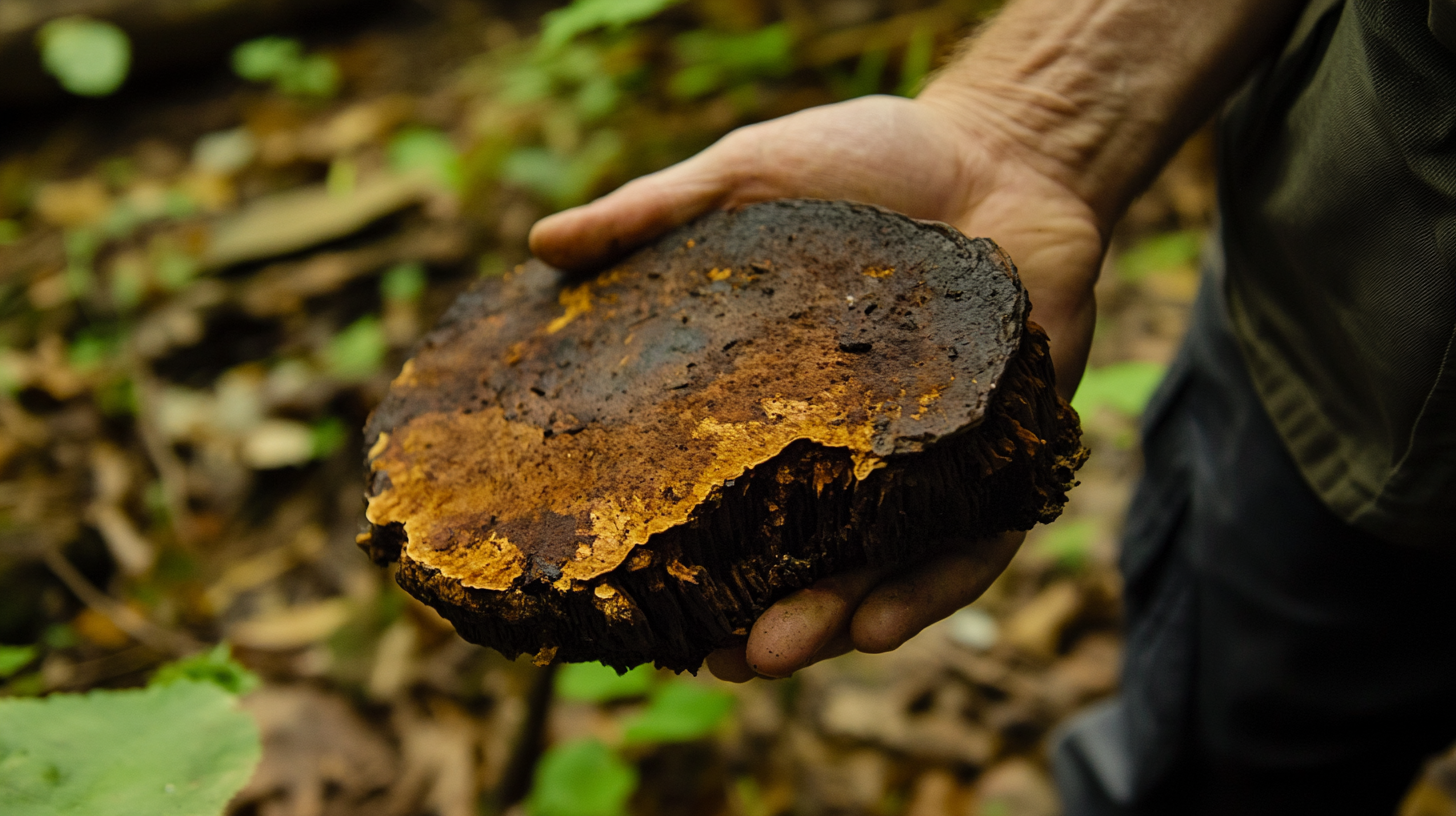In recent years, the Chaga Mushroom Supplement market has seen remarkable growth, even amidst the backdrop of escalating trade tariffs between the United States and China. A report by Grand View Research indicates that the global market for functional mushroom supplements is projected to reach $29.1 billion by 2027, driven by the rising consumer awareness of health benefits and increasing adoption of natural products. Despite the challenges posed by tariffs, which have made sourcing raw materials more difficult for many companies, Chinese manufacturers have demonstrated resilience, leveraging innovative production techniques and strategic partnerships to thrive in this competitive landscape. The Chaga Mushroom, renowned for its antioxidant properties and support for immune health, has continued to gain popularity, capturing the attention of health-conscious consumers both domestically and internationally. This upward trend highlights the adaptability of the supplement industry and the growing market potential for niche products like Chaga, suggesting a promising future despite economic hurdles.

Chaga mushroom, known scientifically as Inonotus obliquus, has gained considerable attention for its numerous health benefits and adaptability in dietary supplements. Rich in antioxidants, particularly melanin and superoxide dismutase, Chaga is praised for its potential to combat oxidative stress, which is linked to various chronic diseases. A report by the Global Market Insights suggests that the functional mushroom supplement market is projected to grow at a CAGR of over 10% from 2021 to 2027, highlighting the increasing consumer interest in natural health products like Chaga.
For consumers looking to integrate Chaga into their wellness routines, here are some tips: First, opt for high-quality supplements that use wild-harvested Chaga to ensure potency and purity. Look for products that specify extraction methods, as dual extraction processes can enhance bioavailability. Additionally, consider starting with powder form for easy addition to smoothies or teas, which can enhance overall health while delivering the mushroom's benefits.
Moreover, studies indicate that Chaga may support immune health and inflammation reduction. A research review in the Journal of Medicinal Food found that compounds in Chaga can modulate immune responses, making it a valuable ally for those aiming to bolster their health naturally. As interest in herbal supplements continues to rise, Chaga's unique properties position it as a desirable addition to the health supplement landscape.
| Benefit | Description | Usage in Supplements | Potential Risk |
|---|---|---|---|
| Immune Support | Chaga mushrooms are rich in beta-glucans which may help boost the immune system. | Commonly included in immune-boosting supplements. | May interact with blood thinners. |
| Antioxidant Properties | Contains high levels of antioxidants which help fight oxidative stress. | Often formulated in antioxidant supplements. | Overconsumption can lead to gastrointestinal disturbance. |
| Anti-Inflammatory Effects | May reduce inflammation in the body, promoting overall health. | Added to anti-inflammatory supplements. | Could lower immune response if taken excessively. |
| Blood Sugar Regulation | Potentially helps in regulating blood sugar levels. | Incorporated into dietary supplements for diabetes management. | Monitoring required for diabetics. |
| Skin Health | Contains compounds that may promote skin health and healing. | Found in certain cosmetic and skin health supplements. | Allergic reactions possible in sensitive individuals. |
Navigating the complexities of international trade, China's market continues to adapt to external challenges, particularly in the burgeoning sector of Chaga mushroom supplements. In recent years, the global demand for these health-focused products has surged, with a market expected to surpass $2 billion by 2026, driven by rising awareness of their potential health benefits such as anti-inflammatory and antioxidant properties. Despite facing trade tariffs that complicate import processes, Chinese suppliers have innovatively restructured their supply chains and established local sourcing strategies to mitigate cost impacts.
Furthermore, the Chinese government's supportive stance on herbal medicine has created a conducive environment for the growth of Chaga supplements. According to a report from the Global Wellness Institute, the herbal supplements market in China is projected to grow at a CAGR of 8.8%, significantly outpacing many other sectors. This optimism reflects an ongoing consumer shift towards natural remedies, even amidst tariff-related barriers. As local companies invest in sustainable production methods and education on the benefits of Chaga mushrooms, they are poised to thrive in this dynamic landscape, turning trade challenges into opportunities for growth and market expansion.

The ongoing trade tariffs in China have posed significant challenges for various industries, yet the resilience of Chinese manufacturing is proving pivotal in maintaining quality, especially in sectors like health supplements. Chaga mushroom supplements, known for their high antioxidant content and immune-boosting properties, have seen a steady demand surge despite these economic hurdles. According to a report from the Chinese Chamber of Commerce, the herbal supplement market is projected to reach nearly $100 billion by 2025, reflecting a compound annual growth rate (CAGR) of 8.6%. This appetite for health products is driving manufacturers to uphold stringent quality standards even as they navigate increased costs attributed to tariffs.
Manufacturers are adapting by enhancing their quality control processes and investing in state-of-the-art production technologies to ensure their products remain competitive. A study by the International Trade Administration indicated that 75% of Chinese manufacturers are focusing on innovation and quality improvement to counteract the effects of tariffs. By prioritizing quality and efficiency, the Chinese supplement industry is not only surviving but thriving, providing consumers with reliable, high-quality Chaga supplements that continue to meet market demands while upholding the integrity of traditional manufacturing practices.
The rising interest in functional mushroom supplements, particularly Chaga mushrooms, highlights a significant trend in consumer health choices. The global functional mushroom market is projected to reach an impressive USD 83.6 billion by 2033, growing at a compound annual growth rate (CAGR) of 11.5%, according to recent analysis from Custom Market Insights. This surge in demand can be attributed to consumers increasingly seeking natural health solutions, with Chaga at the forefront of this trend due to its reputed health benefits.
As the market expands, it’s important for consumers to make informed choices. Here are a few tips: First, look for products that are third-party tested to ensure quality and purity. Second, consider the form of the supplement—whether in powder, capsule, or gummy form—based on your lifestyle and preferences. Lastly, always consult with a healthcare provider before incorporating new supplements, especially if you have pre-existing health conditions or are taking medication.
In parallel to the functional mushroom segment, the medicinal mushrooms market, which includes varieties like Reishi and Lion's Mane, is also seeing substantial growth, with an estimated value increasing at a CAGR of 8.3%. This trend indicates a broader shift towards embracing the potential health benefits associated with mushrooms, making it a vibrant area for both consumers and manufacturers alike.
The herbal supplement market, particularly chaga mushroom supplements, is navigating a complex landscape shaped by recent trade policies. As the United States imposes a 10% tariff on Chinese imports, businesses are left to grapple with the implications of these tariffs, while China responds with retaliatory measures targeting American products. For the herbal supplement sector, which relies on international trade for sourcing raw materials, the uncertainty surrounding trade negotiations adds an extra layer of challenge. Despite these hurdles, the chaga mushroom market demonstrates resilience, as consumers continue to seek out natural health solutions.
Looking toward the future, the impact of these trade policies will likely be profound. While certain dietary supplement ingredients have been exempted from the latest tariff announcements, the potential for reciprocal tariffs could reshape supply chains and pricing strategies. Companies in the herbal supplement industry may need to adapt to shifting economic conditions, focusing on domestic sourcing to mitigate the risks associated with international tariffs. As investors remain cautious amid fluctuating stock markets and economic uncertainty, the chaga mushroom sector's ability to thrive will depend on how effectively it navigates these evolving trade landscapes.

2025 Bio-Botanica, a division of Bio Answer Holdings Inc. All Rights Reserved.